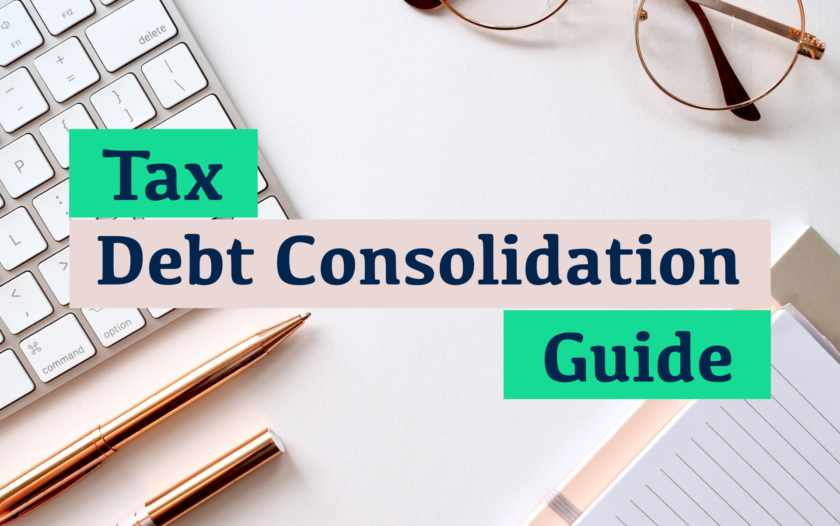Tax Consolidation Guide
About Brooke
Brooke is a freelancer who focuses on the financial wellness and technology sectors. She has a passion for all things wellness and spends her days cooking up healthy recipes, running, and snuggling up with a good book and her fur babies.
Read full bio
At a Glance
If a medical or family emergency has put you behind on IRS tax payments, you may be wondering if you can consolidate the debt as you might do with student loans or credit cards. The answer is yes, but tax debt consolidation may look slightly different from your run-of-the-mill debt consolidation loan. There are multiple ways to handle back taxes, some through the IRS and others on your own. Here’s what you need to know about tax debt consolidation, what it is, and how to do it.
Can you consolidate tax debt?
Paying taxes is one of the great certainties in life (see also: death). And if you’ve been behind on paying your taxes for several years, the IRS is probably knocking on your door for its money. It’s important to know that the IRS handles each year of tax debt independently. So if you’ve missed multiple years of paying your taxes, each debt is accruing its own interest and penalties. But tax debt consolidation can help you work to pay back taxes to the IRS and limit the sting of additional penalties on top of what you already owe.
Tax debt consolidation also can help prevent the IRS from coming after your money in other ways. The IRS has many methods to gather back taxes, including garnishing wages or imposing liens or levies. And the interest rate on unpaid taxes can be up to 25% in some situations. That means the quicker you create a plan for consolidation and start paying what you can, the better off you’ll be when it’s over.
How to consolidate back taxes
The good news is it’s possible to consolidate tax debt both through the IRS and independently. The IRS offers several options to help taxpayers deal with back taxes, including:
- Installment plans: Getting on an installment plan with the IRS is the best way to consolidate tax debt into one manageable monthly payment that allows you to repay your balance due over a span of months or years. Depending on your plan and what you owe, you could still face interest and penalties. But the IRS can work with you to get the best plan option for your unique financial and tax situation.
- Offer in compromise: The offer in compromise program is a form of tax consolidation and debt forgiveness that’s typically only available for those in dire financial circumstances who don’t think they’ll be able to pay what they owe in the foreseeable future. If you’re interested in the offer in compromise program, you’ll need to apply with the IRS, which will determine eligibility. After you’re accepted and make an offer, the IRS can choose to accept or deny it. If accepted, you pay the amount of the offer, and the IRS considers your debt paid in full.
If you fail to qualify for a program through the IRS, it may be time to consider tax debt consolidation using a:
- Personal loan: These unsecured loans often require a good or excellent credit score to get an interest rate that makes taking on the loan worthwhile. You can apply for a personal loan, and if approved, disperse funds to the IRS to cover your tax payments. Then, you’ll work with the loan provider to make monthly payments.
Recommended: Best Places to Get a Personal Loan
- Home equity loan or line of credit: Home equity loans and home equity lines of credit (HELOC) are two secured loan options you can use to consolidate your debt. Because the loans are secured by your home as collateral, you can generally take out these loans even if your credit score isn’t great. As with a personal loan, you’ll receive a lump sum of money that you can use to pay the IRS. You’ll then work with your lender to pay down the loan. But be sure to have a plan in place to repay the loan before you choose this option. Failure to repay the loan timely could put your home in jeopardy of repossession.
Recommended: Home Equity Loans vs. Home Equity Lines of Credit
How does debt consolidation affect my tax return?
The process of debt consolidation may not have an impact on your tax returns. Where things get tricky is if you work through a debt settlement program and have certain debt forgiven. In some instances, debt that’s forgiven will be reported on your return as taxable income.
If you need tax debt consolidation help, it may be best to work with a licensed tax professional. A tax professional can help assess your situation and ensure you understand debt consolidation tax implications before you do anything drastic. They can also help you explore options you may not have considered for tax consolidation and maybe even save you some money in the process.
If you have lingering tax debt with the IRS, seeking debt consolidation can be a solution to help you get on a reasonable payment plan and put the debt behind you. Removing “pay off tax debt” from your financial to-do list will free you up to start to set bigger and more fun financial goals.









